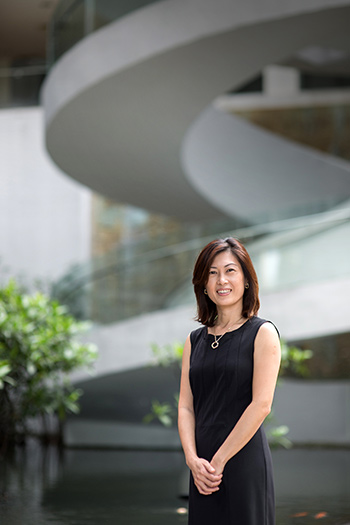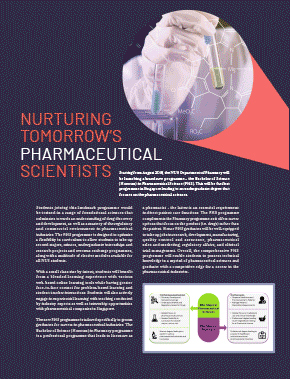H uman lifespan has significantly prolonged; many diseases previously incurable have effective treatments now. Standard and quality of living have also increased owing to advancements in healthcare research. The ever-evolving nature of science and discoveries is what attracted A/Prof Ee to this field. “Pharmaceutical research is very much based on new discoveries and fundamental biology. With every new discovery, we are able to make new medicines or improve on existing ones to for better effect and cost too,” she shares.
For Elston, who is in his final year, being a pharmacy student carries with it a calling to contribute. He has a passion for patient care and giving back to society. However, the versatility of what the discipline can offer is what motivated him to pursue a degree in Pharmacy. “There is an emphasis on developing skills pertinent to patient counselling and inter-professional communication, equipping the pharmacy graduate with a toolkit to be a competent provider of pharmaceutical care, and an effective partner in the modern healthcare delivery team,” he elaborates.

Rachel Ee Pui Lai
Associate Professor
National University of Singapore
Dynamic and Forward-Thinking Curriculum
Graduates are able to enter diverse careers mainly due to the comprehensive training at NUS Pharmacy, which includes medical knowledge and practical skills. Elston feels the structure helps prepare graduates to be effective in the healthcare industry. The course equips graduates with a strong foundation in drug development and healthcare delivery so students are trained in various functions in the pharmaceutical sector. “Our curriculum has had a long-standing reputation for its rigour – the degree has consistently ranked amongst the top twenty globally, and the top three in Asia,” Elston says. A/Prof Ee adds that “it covers a whole spectrum: from drug discovery, development, processing, to delivery to patients (how to give the drug to patients, the side effects, and precautions).” Hence, the prospects for pharmacy graduates are innumerable.
Besides course work, undergraduates have a chance to be exposed to real-life settings via the internship program. “The faculty staff has led an extensive curriculum reform effort together with the Singapore Pharmacy Council, reshaping the curriculum to make it more concise and relevant,” explains Elston. For example, undergraduates of NUS Pharmacy have two junctures for internship. After sophomore year, they serve a three-month internship in drug companies. They may be placed in sales and marketing, regulatory affairs, medical affairs, or distribution. In their fourth year, undergraduates serve another two 12-week rotations, which contribute to their licensing requirement. NUS Pharmacy works closely with major drug companies in Singapore for these attachments and internships, such as Johnson & Johnson, GlaxoSmithKline (GSK), Astrazeneca, Sanofi-Aventis and Nestle Skin Health. Besides drug companies, students may choose to intern with the Health Sciences Authority, major hospitals, and retail pharmacies.
“The programme is a good combination of hard and soft skills,” A/Prof Ee affirms. “We try to prepare the students from day one for their jobs. It is a very intense degree as compared to other sciences, as pharmacy is a specialised degree. But it is very rewarding.”

Elston Foo Sheng Kai
Undergraduate
Bachelors of Science (Pharmacy) with Honours,
National University of Singapore
Future of Pharmaceutics
Leading a research group funded by national grants at the Department, A/Prof Ee and her team are currently working on a research project looking into alternative antimicrobial therapeutics as commonly used antibiotics have become ineffective combatants to bacteria. The team studies antimicrobial peptides (molecules found in human’s bodies’ natural defence system) to make artificial stable versions of them. “Antimicrobial peptides are more effective than antibiotics because they work by breaking down the bacteria’s cell membrane, instead of targeting a defined protein (as in the case of antibiotics). It is difficult for bacteria to develop resistance against that action, as the cell membrane is vital to its survival. As we continue to work on this, the research’s success would signal an exciting breakthrough in combating infectious diseases”, says A/Prof Ee.
Careers of Next Generation Leaders
When asked about the exciting careers that young graduates can look forward to, A/Prof Ee reveals, “Most of our graduates go into medical practice, becoming clinical pharmacists in hospitals. A good portion of them is involved in other areas like clinical research, medical affairs, distributions, research and development, manufacturing, regulatory affairs, or consumer healthcare. The opportunities in this industry are far-reaching and diverse.”
After graduation, Elston plans to practise as a clinical pharmacist and hopes to develop a strong foundation through direct patient care. In the longer-term, he even plans to foray into entrepreneurship. However, ultimately he feels he has a greater responsibility. “Graduates should deliver their help and expertise where it is needed. Personally, I try to strive towards my beliefs by participating actively in community health projects, such as the Tri-generational Home Care project, and more recently, the pharmacy-run CHAMP (Community Health Angels Mentoring Programme) which has a focus on raising the level of medication adherence in patients-at-risk through regular visits by pharmacy undergraduates. I plan to continue with my passion for volunteerism even after I graduate” he muses.

